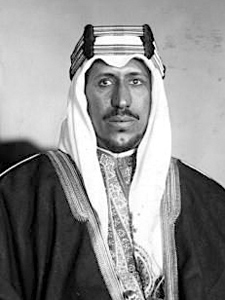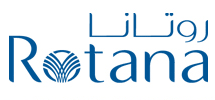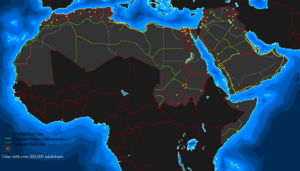This article covers the various forms of transport in the United Arab Emirates (UAE), by road, rail, air, water, etc.

The Arab world, formally the Arab homeland, also known as the Arab nation, the Arabsphere, or the Arab states, comprises a vast group of countries, mainly located in Western Asia and Northern Africa. While the majority of people in the Arab world are ethnically Arab, there are also significant populations of other ethnic groups such as Berbers, Kurds, Somalis and Nubians, among other groups. Arabic is used as the lingua franca throughout the Arab world.

The Cooperation Council for the Arab States of the Gulf, also known as the Gulf Cooperation Council, is a regional, intergovernmental, political, and economic union comprising Bahrain, Kuwait, Oman, Qatar, Saudi Arabia, and the United Arab Emirates. The council's main headquarters is located in Riyadh, the capital of Saudi Arabia. The Charter of the GCC was signed on 25 May 1981, formally establishing the institution.

Saud bin Abdulaziz Al Saud was King of Saudi Arabia from 9 November 1953 until his abdication on 2 November 1964. During his reign, he served as Prime Minister of Saudi Arabia from 1953 to 1954 and from 1960 to 1962. Prior to his accession, Saud was the country's crown prince from 11 May 1933 to 9 November 1953. He was the second son of King Abdulaziz, known as Ibn Saud, the founder of Saudi Arabia.
Abd al-Aziz, frequently also transliterated Abdul-Aziz, is a male Arabic Muslim given name and, in modern usage, surname. It is built from the words ʽAbd, the Arabic definite article and ʽAzīz "Almighty". The name is commonly abbreviated as "ʽAzīz". The name means "servant of the Almighty", al-ʽAzīz being one of the names of God in Islam, which give rise to the Muslim theophoric names.

Air Arabia is an Emirati low-cost airline with its head office in the A1 Building Sharjah Freight Center, Sharjah International Airport, UAE. The airline operates scheduled services to 170 destinations in the Middle East, North Africa, the Indian subcontinent, Central Asia, and Europe to 22 countries from Sharjah, 28 destinations in 9 countries from Casablanca, Fez, Nador, and Tangier, 11 destinations in 8 countries from Ras Al Khaimah, and 6 destinations in 4 countries from Alexandria. Air Arabia's main base is Sharjah International Airport. There are also hubs in Ras Al Khaimah and Abu Dhabi and focus cities in Alexandria and Casablanca.

The Middle East and North Africa is a geographic region whose countries are often referred to by the acronym MENA. It is also known as WANA, SWANA, or NAWA, which alternatively refers to the Middle East as West Asia or as Southwest Asia; this is another way to reference the geographical region, instead of using the more common political terminology.

The Arab Parliament is the legislative body of the Arab League. At the 19th Arab League Summit in Amman, the Arab states agreed to create an Arab Parliament, and came up with a resolution to give Amr Moussa the Secretary General of the Arab League the power to start and create the Parliament. In 2004, in the ordinary Arab League Summit in Algiers was the official date where all Arab League Members agreed to send their representative to the temporary Parliament sessions that took place in the headquarters of the Arab League in Cairo, Egypt, with each member state sending four members, until the Parliament is reassigned permanently to its under-construction office in Damascus.

Arab cinema or Arabic cinema refers to the film industry of the Arab world which depends for most of its production on the Egyptian cinema.

Sama LelTayaran Company Limited, operating as Sama, was a Saudi low-cost airline based at King Fahad International Airport in Dammam, operating scheduled flights within Saudi Arabia and the Middle East. The airline's registered address was in Riyadh.
The Dolphin Gas Project is the natural gas project of Qatar, the United Arab Emirates, and Oman. It is the Gulf Cooperation Council's first cross-border refined gas transmission project and the largest energy-related venture ever undertaken in the region.

Rotana Hotel Management Corporation PJSC is a hotel management company in the Middle East, Africa, the Balkans and Turkey. It has a portfolio of over 100 properties in 26 cities and operates six sub brands which include Rotana Hotels & Resorts, Centro Hotels by Rotana, Rayhaan Hotels & Resorts by Rotana, Arjaan Hotel Apartments by Rotana, Edge by Rotana and The Residences by Rotana.
Beirut39 is a collaborative project between the Hay Festival, Beirut UNESCO's World Book Capital 2009 celebrations, Banipal magazine and the British Council among others in order to identify 39 of the most promising Arab writers under the age of 39. The project was carried out during 2009-10 and followed on the success of Bogotá39, an earlier contest held in 2007 to identify the most promising young Latin American writers. In connection with Port Harcourt being World Book Capital 2014, Africa39 was launched by Hay Festival, featuring 39 writers under the age of 40 from sub-Saharan Africa.
John Elliott, RIBA, was a British architect, who planned and designed luxury hotels and resorts. Born in Portsmouth, England, he was known principally for his contribution in the Middle East and designing 7 star hotel Emirates Palace in Abu Dhabi, United Arab Emirates.
The International Prize for Arabic Fiction Nadwa is an annual writers' workshop for young writers from the Arab world. Held under the aegis of the International Prize for Arabic Fiction, the nadwa is the first such workshop for Arab writers and has been an annual event since 2009.

The 2018–19 Arab Club Champions Cup, officially named the 2018–19 Zayed Champions Cup to mark 100 years since the birth of the late Sheikh Zayed bin Sultan Al Nahyan, was the 28th season of the Arab Club Champions Cup, the Arab world's club football tournament organised by UAFA, and the first season since it was renamed from the Arab Club Championship to the Arab Club Champions Cup.
The 2019–20 Arab Club Champions Cup knockout stage began on 20 August 2019 and ended on 21 August 2021 with the final at the Prince Moulay Abdellah Stadium in Rabat, Morocco, to decide the champions of the 2019–20 Arab Club Champions Cup. A total of 32 teams competed in the knockout stage.

The Saudi Arabia–United Arab Emirates border is 457 km (284 mi) in length and runs from the Persian Gulf coast in the west to the tripoint with Oman in the east.
The 2005 Arab League summit, officially 17th Ordinary Session of the Council of the League of Arab States at the Summit Level, was a regular summit that was held in Algiers, Algeria in March 2005. The city hosted the summit for the third time, following 1973 and 1988. Prior to the conference, the foreign ministers met to agree on proposals that will be presented to the leaders for approval. The Palestinian issue, the unrest in Lebanon and Iraq, Egypt's bid for a permanent seat on the Security Council, and political reform in the member nations were all topics of discussion at the summit.
















